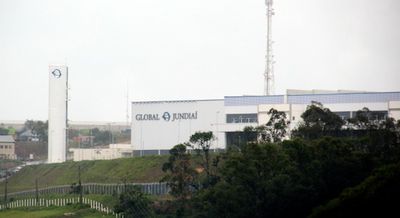Brazil Approves Tax Incentives to Begin iPad Production as Apple Targets its Next Major Market
Brazilian newspaper Folha reports [Google translation] that the Brazilian government has officially approved tax incentives that will allow Foxconn to begin producing iPads in the country. Interministerial Ordinance #34, signed on Monday and published in Brazil's official register today, specifically provides for a reduction in or exemption from certain taxes associated with the production of touchscreen tablet devices lacking a keyboard and weighing less than 750 grams.
According to ministerial decree 34 published Wednesday in the "Official Gazette", the company will be entitled to the benefits provided for in Decree 5906 of September 2006.
The determination provides for exemption or reduction of the IPI (Excise Tax), PIS and Cofins for companies investing in research and development of technology products.
The iPad 2 of course fits within those specifications, weighing in at just over 600 grams with only slight variation among the various models. The ordinance also permits the production of accessories, cables, power supplies and manuals associated with the allowed tablet devices. While the ordinance applies generically to tablet devices, it has clearly been written to support Foxconn's plans for the iPad.
Last April, Foxconn announced a major push to bring iPad production to Brazil, but the company's efforts were slowed as it negotiated with government officials over tax breaks and other issues. As recently as October the company had signaled its intention to begin production by December, and while the company has missed that target it now appears ready to move forward.
 Foxconn's Brazilian iPhone and iPad factory (Source: Cult of Mac)
Foxconn's Brazilian iPhone and iPad factory (Source: Cult of Mac)The launch of iPad production in Brazil comes at a key time for Apple, as CEO Tim Cook noted just yesterday during the company's
earnings conference call that Brazil is its next area of emphasis after China among the "BRIC" countries with newly advanced economies. Russia and India are the other two countries in that grouping and Cook acknowledged that Apple has begun to "go deeper into Brazil" as its next target, although he cautioned against any expectations of Apple retail stores arriving in the country over the near term.
High import taxes on foreign-made goods have prevented Apple from making significant inroads in Brazil, with iPad pricing currently starting at the equivalent of US$925 for the 16 GB Wi-Fi iPad 2. With Foxconn moving iPad production to Brazil under the new tax incentives, Apple should be able to offer more competitive pricing on the device as production ramps up. Photos of a Brazilian-made 8 GB iPhone 4 showed up in late November, suggesting that Foxconn is also ramping up domestic production of new iPhone devices for Brazilian customers.
Popular Stories
Apple's next-generation iPhone 17 Pro and iPhone 17 Pro Max are just over two months away, and there are plenty of rumors about the devices.
Below, we recap key changes rumored for the iPhone 17 Pro models.
Latest Rumors
These rumors surfaced in June and July:Apple logo repositioned: Apple's logo may have a lower position on the back of the iPhone 17 Pro models, compared to previous...
Apple should unveil the iPhone 17 series in September, and there might be one bigger difference between the Pro and Pro Max models this year.
As always, the Pro Max model will be larger than the Pro model:iPhone 17 Pro: 6.3-inch display
iPhone 17 Pro Max: 6.9-inch displayGiven the Pro Max is physically larger than the Pro, it has more internal space, allowing for a larger battery and...
In 2020, Apple added a digital car key feature to its Wallet app, allowing users to lock, unlock, and start a compatible vehicle with an iPhone or Apple Watch. The feature is currently offered by select automakers, including Audi, BMW, Hyundai, Kia, Genesis, Mercedes-Benz, Volvo, and a handful of others, and it is set to expand further.
Apple has a web page with a list of vehicle models that ...
The calendar has turned to July, meaning that 2025 is now more than half over. And while the summer months are often quiet for Apple, the company still has more than a dozen products coming later this year, according to rumors.
Below, we have outlined at least 15 new Apple products that are expected to launch later this year, along with key rumored features for each.
iPhone 17 Series
iPho...
Apple is continuing to refine and update iOS 26, and beta three features smaller changes than we saw in beta 2, plus further tweaks to the Liquid Glass design. Apple is gearing up for the next phase of beta testing, and the company has promised that a public beta is set to come out in July.
Transparency
In some apps like Apple Music, Podcasts, and the App Store, Apple has toned down the...
Since the iPhone X in 2017, all of Apple's highest-end iPhone models have featured either stainless steel or titanium frames, but it has now been rumored that this design decision will be coming to an end with the iPhone 17 Pro models later this year.
In a post on Chinese social media platform Weibo today, the account Instant Digital said that the iPhone 17 Pro models will have an aluminum...
New renders today provide the best look yet relocated Apple logo and redesigned MagSafe magnet array of the iPhone 17 Pro and iPhone 17 Pro Max.
Image via Majin Bu.
Several of the design changes coming to the iPhone 17 Pro model have been rumored for some time, such as the elongated camera bump that spans the full width of the device, with the LiDAR Scanner and flash moving to the right side.
...
Amazon is soon to be back with its annual summertime Prime Day event, lasting for four days from July 8-11, the longest Prime Day yet. As it does every year, Prime Day offers shoppers a huge selection of deals across Amazon's storefront, and there are already many deals you can get on sale ahead of the event.
Note: MacRumors is an affiliate partner with Amazon. When you click a link and make a ...
Apple's position as the dominant force in the global true wireless stereo (TWS) earbud market is expected to continue through 2025, according to Counterpoint Research.
The forecast outlines a 3% year-over-year increase in global TWS unit shipments for 2025, signaling a transition from rapid growth to a more mature phase for the category. While Apple is set to remain the leading brand by...






















